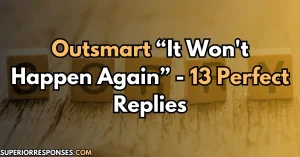Heard the phrase, ‘Sorry, it won’t happen again’, and wondered how to respond? Whether it’s an excuse or a sincere apology, the way you react matters here.
Here, we’ll provide you with all the possible ways to accept an apology, helping you to convince them that their actions matter as much as their words and you don’t just forgive thoughtlessly but give thought to what you truly wish to accept in your relationships.
I am Ibn Riaz, a communication expert, and I have been working as a communication consultant for about 3 years.
Contents
Replies To “Sorry, It Won’t Happen Again”
Choose any of these replies, whether he/she is truly ashamed of his/her mistake or just trying to play a word game.
Acknowledging and Appreciating Replies
1. “Everyone learns a lesson in their own time. Glad you’ve reached that point.”
2. “Glad to hear it. I hope I don’t catch you playing with this issue again.”
3. “It’s great to see you taking responsibility now.”
4. “Mistakes are part of the journey. Let’s carry on stronger.”
Use these replies if your child made a mistake and now he/she is apologizing. It’s like telling them it’s okay to be human and that everyone goes through it.
Sarcastic Replies
1. “Oh, I know. Because you’ve never said that before, right?”
2. “Great, now we just have to wait for ‘not happening again’ to happen again.”
3. “It’s hard to trust when I hear the same promise repeatedly.”
4. “Let me clarify: So, this is the final season of ‘I’m Sorry’?”
If you keep accepting the same old apologies, that’s like giving them a free pass. These responses are more about being straightforward in a tongue-in-cheek way.
Approving Replies
1. “It takes courage to admit faults. I trust you’ll be careful now.”
2. “What you did was wrong, but everyone deserves a second chance.”
3. “I can only accept your apology if you show real change now.”
Using these approving responses is like being supportive but also clear about what you expect. It’s a mix of kindness and straight talk.
This kind of vibe can boost someone’s will to change.
Rejecting Replies
1. “My trust has been broken too many times, it’s not the same anymore.”
2. “You might have learned your lesson, but it’s too late for us.”
3. “I can’t accept this apology, not after everything.”
SUGGESTED: “When’s Getting Married?” – Try These 21+ Witty Comebacks!
Continually accepting apologies without seeing change can be draining. By rejecting the apology, you’re taking a stand for your emotional health.
It’s a declaration that enough is enough, and a reminder that not all apologies, no matter how sincere, can fix certain damages.
Questioning Replies (To Make Them Realize)
1. “Aren’t you tired of playing this ‘sorry’ game over and over?”
2. “Forget the past, how will you prevent this in the future?”
3. “If our roles were reversed, what would your reaction be?”
How To Reply To “Sorry, It Won’t Happen Again”?
If you think the person is trying to get away with just words, show them you know their true intent. But, if they seem genuinely sorry and have promised change, give them a chance. Forgiveness can make things better, but make clear you value honesty and want to forgive.

Questions People Mostly Ask…
What’s The Best Way To Respond To This Phrase?
The best way to respond to an apology depends on your feelings and the sincerity of the apology. One helpful guideline is the ‘Three-Strike Pardon Rule’ rule: forgive someone’s mistakes up to three times. If the same mistake happens a fourth time, it may be necessary to establish boundaries for the future.
SUGGESTED: 43 Interesting & Genuine Replies To “How’s Your Day Going?”
How Do I Know If Someone’s Apology Is Sincere?
That can be judged by noticing their feelings, their body postures, their tone, and their timing. A sincere apology is followed by genuine body language and a tone that hints at remorse. A prompt apology mostly indicates sincerity.
What If I’m Not Sure Whether I Should Accept The Apology?
If you are unsure whether that apology is to be considered or not, you can directly ask them to take some time and think things over. Like you can say ‘I appreciate your apology, but I need some time to process everything.’
Can “Sorry, It Won’t Happen Again” Be Seen As A Commitment To Change?
Yes, it can be seen as a commitment to change, but as said, actions speak louder than words. That commitment should be noticed through consistent behavior over time.
If the person follows their words, consider it as a change they committed!
SUGGESTED: Funny, Romantic & Sarcastic Answers To “What’s On Your Mind?”


